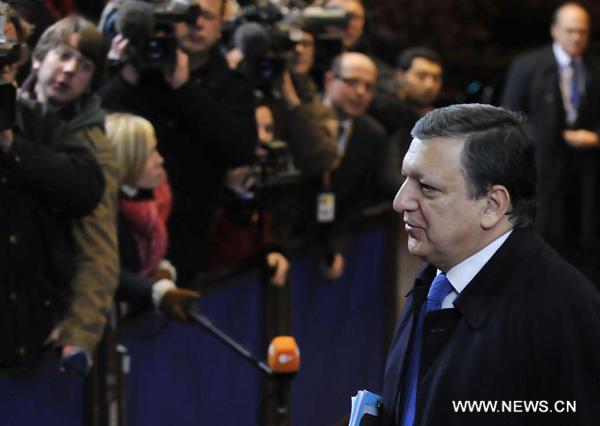EU leaders race to agree on tougher fiscal rules
 0 Comment(s)
0 Comment(s) Print
Print E-mail
Xinhua, December 9, 2011
E-mail
Xinhua, December 9, 2011
The leaders of the European Union (EU) are meeting in Brussels on Thursday evening and Friday to narrow their divergent views on how to enforce tougher fiscal rules to restore market trust and prevent the sovereign debt crisis spiraling out of control.
Stricter budget discipline
According to the grand plan outlined by France and Germany earlier this week, the two leading eurozone economies called for necessary EU treaty changes to give the European Commission powers to scrutinize budgets before they were presented to national parliaments and to veto them if they were found breaching the fiscal rules.
Under the proposals, automatic sanctions would be imposed if a member country breaches the EU rule that a budget deficit should not exceed 3 percent of GDP.
However, the prospect of treaty changes has been greeted with alarm in Britain and Ireland, where any such move would have to be put to a national referendum.
To avoid the political pitfalls and delays of a full-blown treaty change, European Council President Herman Van Rompuy suggested the eurozone enforce tougher budget disciplines through a "fast-track" procedure.
In his report yet to be submitted to EU leaders at the summit, he drew up a plan that would allow the 17 eurozone governments to agree to a "fiscal compact" without holding national referendums or ratifying in national parliaments.
However, the faster and easier approach would prove hard for Germany to accept, as a modest change to the treaties can not give the European Commission the authority to discipline deficit offenders, something Germany has insisted on.
The summit is also set to shed light on the role of the European Central Bank (ECB) in solving the debt crisis, the possibility of issuing eurobonds, and possible early launch of eurozone's permanent bailout fund, the European Stability Mechanism (ESM).
Stakes being high
International rating agency Standard & Poor's earlier this week placed the credit ratings of 15 eurozone countries, including Germany and France, and of the EU on watch for possible downgrades.
The warnings ramped up the stakes of the summit.
European Commission President Jose Manuel Barroso highlighted the importance of the summit earlier Thursday and urged all EU leaders to come up with a convincing remedy to the crisis.
"All the world is watching us. And what the world awaits from us is not more national problems but European solutions," Barroso said.
"The Summit that we are going to start tonight in Brussels is indeed a crucial one. What I expect from all heads of state and government is they do not come saying what they can not do but what they will do for Europe," he added.
The president pointed a problem of confidence and credibility as the core of the crisis, reiterating the support of the Commission for "more convergence, more discipline."
"It is extremely important that we all together, all the European Union shows that the euro is irreversible that we are all standing supporting the euro. And I believe that this is possible," he said.






